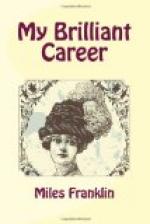Aunt Helen was a clever needlewoman. She made all grannie’s dresses and her own. Now she was making some for me, which, however, I was not to see until I wore them. Aunt Helen had this as a pleasant surprise, and went to the trouble of blindfolding me while I was being fitted. While in bed, grannie and auntie being busy, I was often left hours alone, and during that time devoured the contents of my bookshelf.
The pleasure, so exquisite as to be almost pain, which I derived from the books, and especially the Australian poets, is beyond description. In the narrow peasant life of Possum Gully I had been deprived of companionship with people of refinement and education who would talk of the things I loved; but, at last here was congeniality, here was companionship.
The weird witchery of mighty bush, the breath of wide sunlit plains, the sound of camp-bells and jingle of hobble chains, floating on the soft twilight breezes, had come to these men and had written a tale on their hearts as had been written on mine. The glory of the starlit heavens, the mighty wonder of the sea, and the majesty of thunder had come home to them, and the breathless fulness of the sunset hour had whispered of something more than the humour of tomorrow’s weather. The wind and rain had a voice which spoke to Kendall, and he too had endured the misery of lack of companionship. Gordon, with his sad, sad humanism and bitter disappointment, held out his hand and took me with him. The regret of it all was I could never meet them—Byron, Thackeray, Dickens, Longfellow, Gordon, Kendall, the men I loved, all were dead; but, blissful thought! Caine, Paterson, and Lawson were still living, breathing human beings—two of them actually countrymen, fellow Australians!
I pored with renewed zeal over the terse realism and pathos of Lawson, and enjoyed Paterson’s redolence of the rollicking side of the wholesome life beneath these sunny skies, which he depicted with grand touches of power flashing here and there. I learnt them by heart, and in that gloriously blue receptacle, by and by, where many pleasant youthful dreams are stowed, I put the hope that one day I would clasp hands with them, and feel and know the unspeakable comfort and heart-rest of congenial companionship.
CHAPTER TEN
Everard Grey
Uncle Julius had taken a run down to Sydney before returning to Caddagat, and was to be home during the first week in September, bringing with him Everard Grey. This young gentleman always spent Christmas at Caddagat, but as he had just recovered from an illness he was coming up for a change now instead. Having heard much of him, I was curious to see him. He was grandmamma’s adopted son, and was the orphan of very aristocratic English parents who had left him to the guardianship of distant relatives. They had proved criminally unscrupulous. By finding a flaw in deeds, or something which none but lawyers understand, they had deprived him of all his property and left him to sink or swim. Grannie had discovered, reared, and educated him. Among professions he had chosen the bar, and was now one of Sydney’s most promising young barristers. His foster-mother was no end proud of him, and loved him as her own son.




